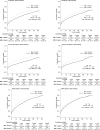Positive influence of being overweight/obese on long term survival in patients hospitalised due to acute heart failure
- PMID: 25710625
- PMCID: PMC4339191
- DOI: 10.1371/journal.pone.0117142
Positive influence of being overweight/obese on long term survival in patients hospitalised due to acute heart failure
Abstract
Background: Obesity is clearly associated with increased morbidity and mortality rates. However, in patients with acute heart failure (AHF), an increased BMI could represent a protective marker. Studies evaluating the "obesity paradox" on a large cohort with long-term follow-up are lacking.
Methods: Using the AHEAD database (a Czech multi-centre database of patients hospitalised due to AHF), 5057 patients were evaluated; patients with a BMI <18.5 kg/m2 were excluded. All-cause mortality was compared between groups with a BMI of 18.5-25 kg/m2 and with BMI >25 kg/m2. Data were adjusted by a propensity score for 11 parameters.
Results: In the balanced groups, the difference in 30-day mortality was not significant. The long-term mortality of patients with normal weight was higher than for those who were overweight/obese (HR, 1.36; 95% CI, 1.26-1.48; p<0.001)). In the balanced dataset, the pattern was similar (1.22; 1.09-1.39; p<0.001). A similar result was found in the balanced dataset of a subgroup of patients with de novo AHF (1.30; 1.11-1.52; p = 0.001), but only a trend in a balanced dataset of patients with acute decompensated heart failure.
Conclusion: These data suggest significantly lower long-term mortality in overweight/obese patients with AHF. The results suggest that at present there is no evidence for weight reduction in overweight/obese patients with heart failure, and emphasize the importance of prevention of cardiac cachexia.
Conflict of interest statement
Figures





Similar articles
-
Association between the body mass index and the clinical findings in patients with acute heart failure: evaluation of the obesity paradox in patients with severely decompensated acute heart failure.Heart Vessels. 2017 May;32(5):600-608. doi: 10.1007/s00380-016-0908-9. Epub 2016 Oct 24. Heart Vessels. 2017. PMID: 27778068
-
Overweight or obese BMI is associated with earlier, but not later survival after common acute illnesses.BMC Geriatr. 2018 Feb 6;18(1):42. doi: 10.1186/s12877-018-0726-2. BMC Geriatr. 2018. PMID: 29409463 Free PMC article.
-
Effects of obesity on short-term mortality in patients with acute heart failure under different nutritional status.BMC Cardiovasc Disord. 2023 Apr 29;23(1):221. doi: 10.1186/s12872-023-03206-x. BMC Cardiovasc Disord. 2023. PMID: 37120589 Free PMC article.
-
The obesity paradox: body mass index and outcomes in patients with heart failure.Arch Intern Med. 2005 Jan 10;165(1):55-61. doi: 10.1001/archinte.165.1.55. Arch Intern Med. 2005. PMID: 15642875
-
Body mass index and mortality in heart failure: a meta-analysis.Am Heart J. 2008 Jul;156(1):13-22. doi: 10.1016/j.ahj.2008.02.014. Am Heart J. 2008. PMID: 18585492 Review.
Cited by
-
Obesity paradox and heart failure.Eat Weight Disord. 2021 Aug;26(6):1697-1707. doi: 10.1007/s40519-020-00982-9. Epub 2020 Aug 26. Eat Weight Disord. 2021. PMID: 32851592 Review.
-
The Relationship Between Body Mass Index and In-hospital Survival in Patients Admitted With Acute Heart Failure.Front Cardiovasc Med. 2022 Apr 28;9:855525. doi: 10.3389/fcvm.2022.855525. eCollection 2022. Front Cardiovasc Med. 2022. PMID: 35571201 Free PMC article.
-
Diagnostic performance of body mass index to identify adiposity in women.Eur J Clin Nutr. 2016 Aug;70(8):898-903. doi: 10.1038/ejcn.2015.211. Epub 2015 Dec 16. Eur J Clin Nutr. 2016. PMID: 26669574
-
Association between body mass index and clinical outcomes in patients with acute myocardial infarction and reduced systolic function: Analysis of PARADISE-MI trial data.Eur J Heart Fail. 2025 Mar;27(3):558-565. doi: 10.1002/ejhf.3542. Epub 2024 Dec 18. Eur J Heart Fail. 2025. PMID: 39692068 Free PMC article. Clinical Trial.
-
Beneficial effects of leptin treatment in a setting of cardiac dysfunction induced by transverse aortic constriction in mouse.J Physiol. 2017 Jul 1;595(13):4227-4243. doi: 10.1113/JP274030. Epub 2017 May 23. J Physiol. 2017. PMID: 28374413 Free PMC article.
References
-
- He J, Ogden LG, Bazzano LA, Vupputuri S, Loria C et al. (2001) Risk factors for congestive heart failure in US men and women: NHANES I epidemiologic follow-up study. Arch Intern Med 161: 996–1002. - PubMed
-
- Kenchaiah S, Evans JC, Levy D, Wilson PW, Benjamin EJ et al. (2002) Obesity and the risk of heart failure. N Engl J Med 347: 305–13. - PubMed
Publication types
MeSH terms
LinkOut - more resources
Full Text Sources
Other Literature Sources
Medical

